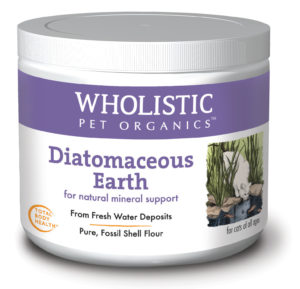How To Safely Protect Your Cat From Fleas & Pests

Rocket
Fleas, chemicals and cats
The seasons are changing, and before we know it summer will be upon us. Our cats love to soak up the sun and bask in the summer heat in our courtyard. In fact, it’s Rocket’s favorite past time! Fortunately they aren’t exposed to fleas and ticks like other cats who may live or spend time outdoors. If your cat has access to the outdoors, or if you’ve noticed fleas on him, today’s article could save his life. There are easy ways to protect your cat from fleas without using products that are laden with toxic chemicals.
I learned something shocking recently when watching The Truth About Pet Cancer documentary. In 1989 there was a study to examine if there was a connection between pesticide treatments (flea, tick, and heartworm) and cancer. The result was mind blowing: 60% of the animals developed bladder cancer! That statistic right there would stop me from ever giving me cat any such product today. I shudder to think that many years ago for whatever reason (I can’t even remember why) I used to give my indoor cats a monthly dose of flea preventive. They used to run away and fight me as I applied it to the back of their necks. Perhaps you can relate? Now I realize they were much smarter than I was! Not only was it extremely toxic–essentially poison–but they didn’t even need it.
How toxic are pest preventives?
Just because a product is sold at your vet’s office or pet store doesn’t mean it doesn’t come with great risks. How often do we actually think about the ingredients in flea and tick treatments? The truth is these products actually kill pests by poisoning the blood of our cats. If our cat’s blood is full of poison imagine what it’s doing to our cat’s organs, cells and body! Short term use or even a single dose can cause skin irritations, seizures, paralysis, and even death. Long term use produces a toxic load on the body that can have severe consequences including cancer.
Deterrents are your cat’s best defense
 Instead of opting for chemical preventives, the better choice is to find ways to deter fleas and ticks from being attracted to your cat. Dr. Karen Becker, DVM, offers some great insight on this topic:
Instead of opting for chemical preventives, the better choice is to find ways to deter fleas and ticks from being attracted to your cat. Dr. Karen Becker, DVM, offers some great insight on this topic:
Fleas are not typically attracted to healthy pets. They’re typically drawn to the weakest animals they can find, first, so one of the best defenses against flea infestations is to feed your pet a balanced, species-appropriate fresh-food diet that will help keep his immune system functioning optimally. (Learn more about how to give your cat the best diet possible here.)
In addition to diet, remove the environmental factors that can negatively impact your pet’s immune system including:
- Poor water quality: make sure to provide fluoride- and chlorine-free drinking water
- Too many vaccines: demand your vet check protection levels prior to giving more vaccines (called a titer test). Vaccinating unnecessary doesn’t build your pet’s immune system, it destroys it.
- Toxic household chemical load: eliminate non-organic pet beds sprayed with PBDEs (flame retardants) that disrupt your pet’s endocrine system and toxic household cleaners that end up inside your pet.
- Yard chemicals: eliminate pesticides, herbicides and fertilizers around your home that negatively impact your pet’s immunologic health
- EMFs: provide your pet with a safe zone that’s free from toxic levels of electromagnetic fields from electrical devices in the home.
In case you are currently using a spot-on treatment of some kind she highly recommends detoxing the liver.
The liver will be tasked with processing the chemicals that make it into the bloodstream, it can be very beneficial to give your dog or cat a supplement to help detoxify her liver. I recommend milk thistle, which is a detox agent and also helps to actually regenerate liver cells.
You can get milk thistle at any health food store. Work with your vet on how much to give your pet depending on her age, weight and the medications she’s taking. I recommend one dose daily for seven days following any flea, tick or heartworm application.
Another product I recommend is chlorella, a super green food that is a very powerful detox agent. Your holistic vet should also advise you about how much chlorella to give your pet depending on her toxin load.
Natural flea and tick deterrents for cats
There are several things you can use to help protect your cat naturally without toxic chemicals. 
- Diatomaceous Earth–“Food grade diatomaceous earth is a great natural alternative to chemical pesticides, especially when trying to get rid of fleas and ticks. … Diatomaceous earth is composed of tiny organisms known as diatoms which have the ability to lacerate the exoskeletons of various types of insects and kill them through dehydration.” Use caution applying topically as it can be very drying and can irritate the lungs if inhaled. This is also great to use in your yard to kill fleas and other pests.
- Make a homemade pest deterrent spray–Dr. Becker’s favorite recipe: Mix 8 ounces of pure water with 4 ounces of organic, unfiltered apple cider vinegar, plus 10 drops of neem oil and 10 drops of catnip oil. Neither neem nor catnip oil are truly essential oils — they’re distillates, so we’re safe using those.
- Pulex irritans 30C, a homeopathic remedy–Recommended for pets who exhibit an allergic reaction to flea bites. The remedy is extracted from the flea’s saliva. It works in a way similar to a vaccine.
- Essential Oil sprays–Adding a few drops of Lemongrass oil or Geranium oil to a spray bottle filled with water is a great way to keep fleas and other pests from attacking your cat. Products like Flea eX are perfect to use in and around your cat’s bedding and furniture.
- Natural flea and tick shampoos–Made without chemicals these products have been formulated with botanical extracts and are safe for cats. (Note: Please read labels carefully as many dog shampoos are not recommended to use on cats.)
The next time your vet recommends a chemical flea preventive just say no. By incorporating these simple ways to keep fleas and other pests away from your kitty he can enjoy spending time outside without the risk of becoming a target.
Do you use a natural flea product for your cat? Share in the in the comments below! Sign up here to follow all our posts!

